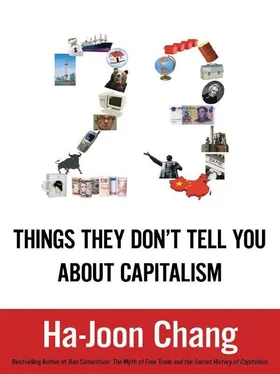Thing 8: Capital has a nationality
The real hero of globalization has been the transnational corporation. Transnational corporations, as their name implies, are corporations that have gone beyond their original national boundaries. They may be still headquartered in the country where they were founded, but much of their production and research facilities are outside their home country, employing people, including many top decision-makers, from across the world. In this age of such nation-less capital, nationalistic policies towards foreign capital are at best ineffective and at worst counterproductive. If a country’s government discriminates against them, transnational corporations will not invest in that country. The intention may be to help the national economy by promoting national firms, but such policies actually harm it by preventing the most efficient firms from establishing themselves in the country.
Despite the increasing ‘transnationalization’ of capital, most trans-national companies in fact remain national companies with international operations, rather than genuinely nation-less companies. They conduct the bulk of their core activities, such as high-end research and strategizing, at home. Most of their top decision-makers are home-country nationals. When they have to shut down factories or cut jobs, they usually do it last at home for various political and, more importantly, economic reasons. This means that the home country appropriates the bulk of the benefits from a transnational corporation. Of course, their nationality is not the only thing that determines how corporations behave, but we ignore the nationality of capital at our peril.
Carlos Ghosn lives globalization
Carlos Ghosn was born in 1954 to Lebanese parents in the Brazilian city of Porto Velho. At the age of six, he moved with his mother to Beirut, Lebanon. After finishing secondary school there, he went to France and earned engineering degrees from two of the country’s most prestigious educational institutions, École Polytechnique and École des Mines de Paris. During his eighteen years at the French tyre-maker Michelin, which he had joined in 1978, Ghosn acquired a reputation for effective management by turning the company’s unprofitable South American operation around and by successfully managing the merger of its US subsidiary with Uniroyal Goodrich, which doubled the size of the company’s US operation.
In 1996, Ghosn joined the state-owned French car-maker Renault and played a key role in reviving the company, affirming his reputation for ruthless cost-cutting and earning the sobriquet ‘le cost killer’, although his actual approach was more consensual than that name suggests. When Renault acquired Nissan, the loss-making Japanese car-maker, in 1999, Ghosn was sent to Japan to put Nissan back into shape. Initially, he faced stiff resistance to his un-Japanese way of management, such as sacking workers, but he turned the company completely around in a few years. After that, he has been so totally accepted by the Japanese that he has been made into a manga (comic book) character, the Japanese equivalent of beatification by the Catholic Church. In 2005, he stunned the world once again by going back to Renault as CEO and president, while staying on as a co-chairman of Nissan – a feat compared by some to a football coach managing two teams at the same time.
Carlos Ghosn’s life story sums up the drama that is globalization. People migrate in search of a better life, sometimes literally to the other side of the world, as Ghosn’s family did. Some of the migrants, like Ghosn’s mother, go back home. This is a big contrast to the days when, for example, Italian immigrants to the US refused to teach their children Italian, as they were so determined not to go back to Italy and wanted their children totally assimilated. Many youngsters from poorer countries with ambition and brains now go to a richer country to study, as Ghosn did. These days, many managers work for a company based in a foreign country, which often means living and working in yet another foreign country (or two) because your company is transnational. Ghosn, a Lebanese Brazilian return-migrant, worked in Brazil, the US and Japan for two French companies.
In this globalized world, the argument goes, nationality of capital is meaningless. Corporations may have started and still be headquartered in a particular country, but they have broken out of their national borders. They now locate their activities wherever the return is the greatest. For example, Nestlé, the Swiss food giant, may be headquartered in the Swiss city of Vevey, but less than 5 per cent of its output is produced in Switzerland. Even if we consider Nestlé’s ‘home’ to be Europe, rather than Switzerland, its home base accounts for only around 30 per cent of its earnings. It is not just the relatively low-grade activities such as production that transnational corporations are conducting outside their home countries. These days, even top-end activities such as R&D are often located outside the home country – increasingly in developing countries, such as China and India. Even their top managers are drawn, like Ghosn, from an international pool of talent, rather than from exclusively national pools.
The upshot is that a company has no national loyalty any more. A business will do what it has to do in order to increase its profit, even if it means hurting its home country by shutting plants down, slashing jobs, or even bringing in foreign workers. Given this, many people argue, it is unwise to put restrictions on foreign ownership of companies, as many governments used to. As long as the company generates wealth and jobs within its borders, the country should not care whether the company is owned by its citizens or foreigners. When all major companies are ready to move anywhere in search of profit opportunities, making investment by foreign companies difficult means that your country is not going to benefit from those foreign companies that have identified good investment prospects in your country. It all makes sense, doesn’t it?
Chrysler – American, German, American (again) and (becoming) Italian
In 1998, Daimler-Benz, the German automobile company, and Chrysler, the US car-maker, were merged. It was really a takeover of Chrysler by Daimler-Benz. But when the merger was announced, it was depicted as a marriage of two equals. The new company, Daimler-Chrysler, even had equal numbers of Germans and Americans on the management board. That was, however, only for the first few years. Soon, the Germans vastly outnumbered the Americans on the board – usually ten to twelve to just one or two Americans, depending on the year.
Unfortunately, the takeover was not a great success, and in 2007 Daimler-Benz sold Chrysler off to Cerberus, an American private equity fund. Cerberus, being an American company, made up Chrysler’s board of directors mostly with Americans (with some representation from Daimler, which still held a 19.9 per cent stake).
In the event, Cerberus failed to turn the company around and Chrysler went bankrupt in 2009. It was restructured with US federal government financial aid and a major equity investment by Fiat, the Italian car-maker. When Fiat became the leading shareholder, it made Sergio Marchionne, the CEO of Fiat, also the new CEO of Chrysler and appointed another Fiat manager to Chrysler’s nine-member board of directors. Given that Fiat has only a 20 per cent stake at the moment but has the option to increase it to 35 per cent and eventually to 51 per cent, it is highly likely that the proportion of Italians on the board will increase over time, with the increase in Fiat’s ownership share.
Читать дальше






![Ally Carter - [Gallagher Girls 01] I'd Tell You I Love You But Then I'd Have to Kill You](/books/262179/ally-carter-gallagher-girls-01-i-d-tell-you-i-lo-thumb.webp)





